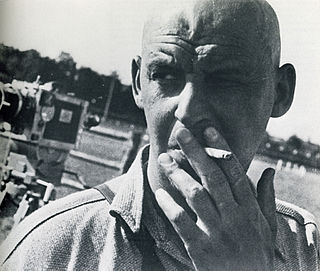A Quote by Samuel Johnson
The eye of the mind, like that of the body, can only extend its view to new objects, by losing sight of those which are now before it.
Related Quotes
Contradictions of perspective. Contrasts of light. Contrasts of form. Points of view impossible to achieve in drawing and painting. Foreshortenings with a strong distortion of the objects, with a crude handling of matter. Moments altogether new, never seen before compositions whose boldness outstrips the imagination of painters Then the creation of those instants which do not exist, contrived by means of photomontage. The negative transmits altogether new stimuli to the sentient mind and eye.
It is, however, not necessary, that a man should forbear to write, till he has discovered some truth unknown before; he may be sufficiently useful, by only diversifying the surface of knowledge, and luring the mind by a new appearance to a second view of those beauties which it had passed over inattentively before.
When he tries to extend his power over objects, those objects gain control of him. He who is controlled by objects loses possession of his inner self... Prisoners in the world of object, they have no choice but to submit to the demands of matter! They are pressed down and crushed by external forces: fashion, the market, events, public opinion. Never in a whole lifetime do they recover their right mind!... What a pity!
Natural selection, the blind, unconscious, automatic process which Darwin discovered, and which we now know is the explanation forthe existence and apparently purposeful form of all life, has no purpose in mind. It has no mind and no mind's eye. It does not plan for the future. It has no vision, no foresight, no sight at all. If it can be said to play the role of the watchmaker in nature, it is the blind watchmaker.
I earnestly wish to point out in what true dignity and human happiness consists. I wish to persuade women to endeavor to acquire strength, both of mind and body, and to convince them that the soft phrases, susceptibility of heart, delicacy of sentiment, and refinement of taste, are almost synonymous with epithets of weakness, and that those beings are only the objects of pity, and that kind of love which has been termed its sister, will soon become objects of contempt.
Art is the microscope of the mind, which sharpens the wit as the other does the sight; and converts every object into a little universe in itself. Art may be said to draw aside the veil from nature. To those who are perfectly unskilled in the practice, unimbued with the principles of art, most objects present only a confused mass.
All these stupendous objects are daily around us; but because they are constantly exposed to our view, they never affect our minds, so natural is it for us to admire new, rather than grand objects. Therefore the vast multitude of stars which diversify the beauty of this immense body does not call the people together; but when any change happens therein, the eyes of all are fixed upon the heavens.
Weary with toil, I haste me to my bed The dear repose for limbs with travel tired; But then begins a journey in my head To work my mind, when body's work's expir'd: For then my thoughts-from far where I abide- Intend a zealous pilgrimage to thee, And keep my drooping eyelids open wide, Looking on darkness which the blind do see: Save that my soul's imaginary sight Presents thy shadow to my sightless view, Which, like a jewel hung in ghastly night, Makes black night beauteous and her old face new. Lo! thus, by day my limbs, by night my mind, For thee, and for myself no quiet find.
These tenses-past, present and future-are not the tenses of time; they are tenses of the mind. That which is no longer before the mind becomes the past. That which is before the mind is the present. And that which is going to be before the mind is the future. Past is that which is no longer before you. Future is that which is not yet before you. And present is that which is before you and is slipping out of your sight. Soon it will be past.
You can indeed be aware of your body, but you can also be aware of your mind - you can right now notice all the thoughts and ideas and images floating in front of the mind's inward eye. You can, in other words, experience your mind, be aware of your mind. And it's very important to experience your mind directly, cleanly, intensely, because only by bringing awareness to the mind can you begin to transcend the mind and be free of its limitations.
You can have a team of unconventional thinkers, as well as conventional thinkers. If you don't have the support of others you cannot achieve anything altogether on your own. It's like a cry in the wilderness. In each instance there were others who could see the same thing, and there were others who could not. It's an obvious difference we see in those who you might say have a bird's eye view, and those who have a worm's eye view. I've come to realize that we all have a different mind set, we all see things differently, and that's what the human condition is really all about.




































